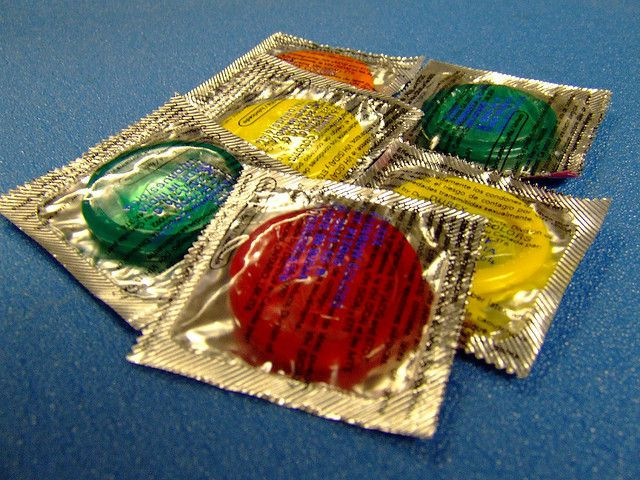Condoms Provide a 'Buffer System,' Allowing Friendly Bacteria To Grow In The Vagina

With so many different types of contraception available these days, it may be difficult to decide which one to use. But the answer may be the good old fashioned condom. Besides protecting from sexually transmitted infections (STI), it may also help a type of vaginal bacteria flourish, according to a new study.
A team of Chinese researchers focused on the bacterial group lactobacillus, a "friendly" bacteria that lives in many parts of the body, including the digestive, urinary, and genital systems. Because of this, lactobacillus supplements are often given to women with vaginal infections or urinary tract infections (UTIs). In the vagina, it's believed to help prevent a condition known as bacterial vaginosis (BV) infection by producing lactic acid and hydrogen peroxide.
Bacterial Vaginosis is a condition in which more harmful bacteria grow within the vagina. It could cause vaginal discharge, unpleasant odors, and a burning sensation during urination.
The researchers at the Beijing Friendship Hospital already knew that increased sexual activity reduced the number of lactobacilli colonies within the vagina, but they wanted to understand the effects of non-hormonal contraception on the bacteria.
They tested the bacteria inside 164 participants' vaginas. Of these women, 72 were using condoms, 57 were using an intrauterine device (IUD), and 35 were using the "rhythm method," which involves abstaining from sex on the days of a woman's cycle that she's most likely to get pregnant. All of the women were between 18 and 45 years old, married, and sexually active.
The results showed that women who used condoms had a 95.8 percent prevalence of lactobacillus, compared to 84.2 percent in the IUD group, and 88.6 percent in the rhythm group. What's more, L. crispatus, a major determinant of normal vaginal microbial flora, was found to be 20 percent more prevalent in the condom group than the IUD group.
"As a perfect barrier, condom can help maintain the vaginal acidic buffer system and the vaginal lactobacilli population when sperm enters vagina during sex," the researchers wrote.
This is because lactobacilli produces lactic acid, making the vagina highly acidic, normally with a pH of about 4.5. Sperm, however, has a basic pH of about 7.2. Unprotected sex could disrupt the balance of acid-producing bacteria. The Centers for Disease Control and Prevention (CDC) notes that douching could also result in bacterial disruption, and a higher likeliness of BV.
China has promoted the use of contraception ever since it implemented its one-child policy in 1979, which allows urban couples to have only one child in an effort to control its population of 1.3 billion people. As of 2007, 90 percent of women were on contraception, with half of them on non-hormonal contraception.
Source:
Ma L, Su J, Wang J, et al. Consistent Condom Use Increases the Colonization of Lactobacillus crispatus in the Vagina. PLOS One. 2013.



























